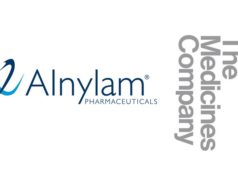The Medicines Company and Alnylam Pharmaceuticals have announced positive results from the analysis of day 90 data for 497 patients, as well as analysis of preliminary day 180 data for 189 patients, enrolled in the ORION -1 Phase 2 study of inclisiran. Data from ORION-1 were presented at the 2016 American Heart Association (AHA) scientific sessions (12–16 November, New Orleans, USA). Inclisiran is an investigational GalNAc-conjugated RNAi therapeutic targeting PCSK9 that is being developed for the treatment of hypercholesterolemia.
According to a press release, inclisiran was generally well tolerated and no material safety issue was observed, including no elevations of liver enzymes considered related to study medication and no neuropathy or change in renal function. Overall incidence of treatment emergent adverse events was 54% both in patients randomized to placebo and in patients randomised to inclisiran, with no differences between inclisiran doses. Injection site reactions with inclisiran were infrequent (observed in 3.2% of patients), mild or moderate, and transient—in only 2.4% of patients, the reported injection site reactions started or was still present four or more hours after dosing.
Baseline LDL cholesterol was approximately 130mg/dL among 497 randomised and treated patients. Among these patients, one 300mg subcutaneous injection of inclisiran achieved mean LDL cholesterol reductions of 51% at day 60, which were durable to day 90 (mean 45% and up to 76%). All differences relative to placebo in these 497 patients were statistically significant (p<0.0001). Among 189 randomised and treated patients who had been followed for 180 days or more by the interim data cut-off date of October 25, 2016, one 300mg subcutaneous injection of inclisiran achieved mean LDL cholesterol reductions of 59% at day 60, which were durable to day 90 (mean 50%) and day 180 (mean 43% and up to 81%). Two 300mg injections of inclisiran—one given on day one and one on day 90—achieved a mean LDL cholesterol reduction of 57% at day 120, which was durable to day 180 (mean 52% and up to 81%). All differences relative to placebo in these 189 patients were statistically significant (p<0.0001).
John JP Kastelein (Department of Vascular Medicine, the Academic Medical Center of the University of Amsterdam, Amsterdam, The Netherlands), comments: “Elevated LDL cholesterol remains a major risk factor for coronary artery disease, and new therapies are needed for patients who are refractory or intolerant to current approaches for management of their LDL cholesterol levels. PCSK9 therapies have now emerged as a new class of drugs for treatment of hypercholesterolaemia, and I believe that these agents have the potential to make a meaningful difference for patients. ORION-1 strengthens prior data with inclisiran, especially the degree and durability of LDL-C lowering effects. If the safety and efficacy of this novel investigational PCSK9 synthesis inhibitor can be confirmed in Phase 3 studies to support approval, it may offer an important treatment option for patients, physicians, and payers.”
ORION-1 is a placebo-controlled, double-blind, randomised Phase 2 study of single or multiple subcutaneous injections of inclisiran in a total of 501 patients with atherosclerotic cardiovascular disease (ASCVD) or ASCVD-risk equivalents (eg. diabetes and familial hypercholesterolemia) and elevated LDL cholesterol despite maximum tolerated doses of LDL cholesterol lowering therapies. The study compares the effect of different doses of inclisiran and evaluates the potential for an infrequent dosing regimen. The primary endpoint of the study is the percentage change in LDL cholesterol from baseline at day 180.










